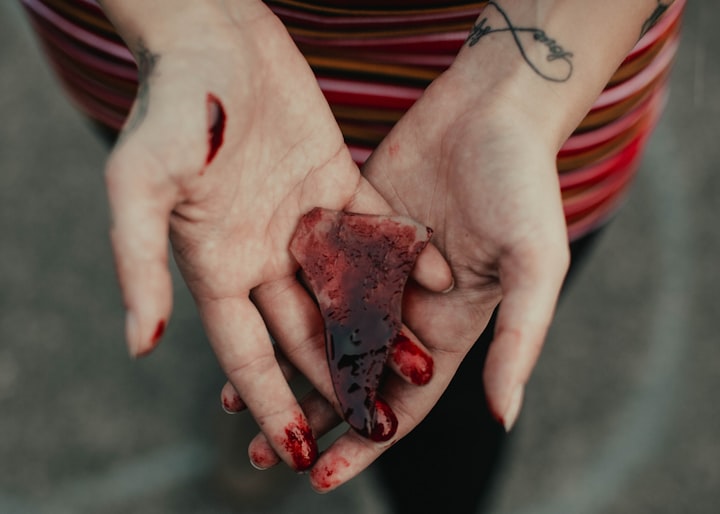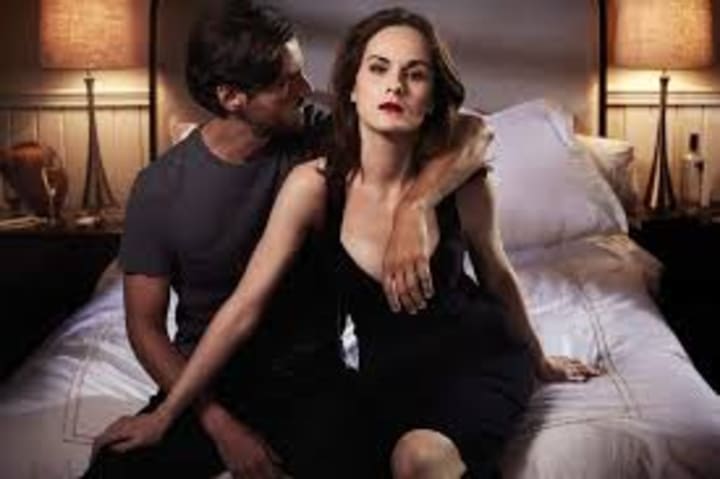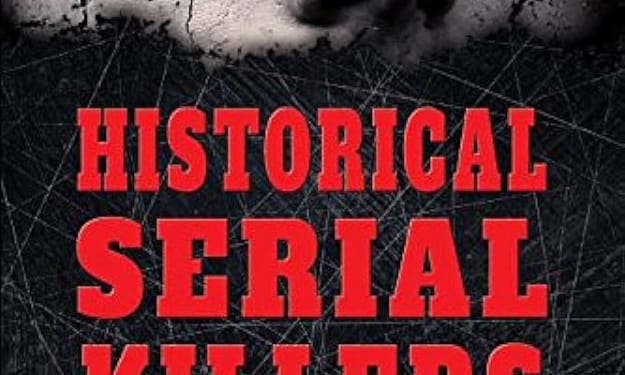If Dexter, Then Orphan Black
The dark path that winds from Dexter to Mindhunter to The Sinner to Good Behavior to Killing Eve to Orphan Black

I want my shows to walk the edge.
Give me psychological thrillers. Give me villains who are intelligent, mysterious, murderous, and deliciously deviant. Give me mind-benders.
Give me television that strips away the pretense of what it means to be human or inhuman.
My favorite shows grapple with what makes human behavior good or bad--and who decides?

I can’t get enough of smart shows that feature strong, clever, complex, and terribly flawed characters. If a show is compelling and the characters are masterful, there's no genre I don't get into: drama, true crime, mystery, graphic novel adaptation, science fiction, fantasy, western, documentary.
But my favorites are psychological thrillers.
For Vocal's If This, Then That, I'll carve a path that trails Dexter all the way to Orphan Black, one dangerous step at a time.


First, let's get right to what all of these shows get right. The common denominators are excellence in acting, casting, directing, and editing. All feature exquisite storytelling, enticing writing, and authentic dialogue. All deliver plots and subplots that completely captivate, and the supporting casts are magnificent. Cinematography, lighting and sound design also are crucial to each of these shows' indelible tapestries. And their soundtracks deftly apply the power of music to underscore the narrative.

These are disturbing must-watch shows that sit with you, squeezing marrow from your bones like toothpaste from a tube. They gut-punch, repeatedly. None is for the faint of heart.
You’ve been warned.
I'll bring the popcorn, you dim the lights.

We Begin with Dexter

If Dexter, Then Mindhunter

If Mindhunter, Then The Sinner

If The Sinner, Then Good Behavior

If Good Behavior, Then Killing Eve

If Killing Eve, Then Orphan Black

First we open our minds to Dexter and the darkly foreboding path that lies ahead. We risks everything to trail him all the way to the shadowy world of Orphan Black...
Dexter
For me, there’s no better place to start. Dexter's dark passenger slices its way into my heart and straps me in until it’s done with me.
Dexter is an intensely dark psychological drama. Michael C. Hall earned two Golden Globes for his portrayal of Dexter Morgan, the title character, and he deserves every accolade. The supporting cast are legends as well. I'll not tell you about them because I don't want to inadvertently give anything away. But I will tell you Jennifer Carpenter as Deb Morgan and Erik King as James Doakes are especially clever.
This masterpiece brings the very psychological complexity I crave. It’s also a mystery, a dark comedy and a gutsy thriller, with splashes of romance. There’s something for everyone. Except the kids.
Dexter Morgan, our smart, likable, good looking next-door neighbor, is quiet in that keeps-to-himself way. He's a forensic technician who specializes in blood spatter analysis as an integral member of the fictional Miami Metro Police Department.

Continually, Dexter finds himself elbows deep in the worst of human cruelty. He visits crime scenes alongside his gutter-mouthed train wreck of a sister, played by Carpenter, who is a capable detective in her own right. Except we know something she doesn't detect. Dexter isn't normal. Dexter kills people. But it’s okay. Sort of.
Dexter's a vigilante serial killer. He only kills people who deserve it. His homicides are necessary, according to Dexter's code.
Like scores of other fans, I find myself cheering on Dexter knowing he’s a murderer--because he’s a murderer. That’s the very edge I want to walk with shows. I cuddle up with a blanket and allow my TV detective brain to interrogate the scenes. We get to understand Dexter. Not necessarily agree with him, but see him. We delve into the depravity. We watch how he operates and learn how he thinks. We see with our own eyes how he hunts and handles murderers all the while committing murders himself.
Let’s just say Dexter has some disturbing ways.
When bad guys slip the net, Dexter takes it personally, so he spends his down time splattering sheets of plastic. Every person he ends gets special treatment. His victims are murdered inside a shrine to their crimes: Photographs of Dexter’s victims’ victims. Let that sink in.
In Dexter’s mind, this is accountability.
The first season is perfect, derived from Darkly Dreaming Dexter, the 2004 novel by Jeff Lindsay. I'd go so far as to say the first four seasons are hellaciously good. Sit-watch. Stand-watch. Pace-watch. Watch-watch-watch. It's intense, chew your nails to the quick crazy good.
The last four seasons are compelling, too, but different. They struggle to match the intensity and originality, but they are still riveting. Show runners, cast, and crew openly agree that the series finale in particular did not do Dexter justice, so a limited series returns in 2021 to right that wrong.
You coming?
Since Dexter aired in 2013, before the pandemic, it's time to (re)watch Dexter. Binge your heart out. By the time you've sloshed your way to the original series ender, it'll be time to catch the new limited series.
Earn yourself a place at the table--just not Dexter's table.
The eagerly anticipated, sure to be darkly satisfying ending is expected to deliver. We'll finally get to see what dear Dexter so richly deserves after the writers have had time to ponder.
If Dexter, Then Mindhunter
Like Dexter, Mindhunter is an American psychological crime thriller. Its tone, timber, mood, and pacing are quite different than Dexter and, hard as it might be to imagine, although this one's sleepier, this one is even creepier. Mindhunter's subject matter is shiver worthy. Dexter is fiction. Mindhunter is not.
The series is based on a 1995 true-crime book, Mindhunter: Inside the FBI’s Elite Serial Crime Unit written by expert FBI agent John E. Douglas and Mark Olshaker.
A dramatized series, Mindhunter tackles the origin story of the Federal Bureau of Investigation’s Behavioral Science Unit (BSU), coined the Behavioral Analysis Unit (BAU) for the small screen. (The fictional "BAU" will be instantly recognizable to Criminal Minds fans, who likely would enjoy Mindhunter given its grandfatherly relevance to that long-running crime drama, of which I am a fan. Criminal Minds is more visually disturbing and features a tightly knit fictional FBI BAU unit, whereas Mindhunter is the Rosetta Stone of criminal profiling.)
With Mindhunter we follow three main characters.
- Played by Holt McCallany, Bill Tench is based on pioneering FBI agent Robert K. Ressler.
- Played by Jonathan Groff, Holden Ford is loosely based on John E. Douglas, the agent who literally wrote the book.
- Played by Anna Torv, Wendy Carr is a fictitious character, and not an FBI agent.
Carr is based on Ann Wolbert Burgess, who collaborated with BSU agents in the 1970s and 80's. Her expertise in the series is two-fold. She's a psychiatric forensic nurse researcher and she's a prominent Boston College nursing professor. She helped to provide the framework for the BSU's groundbreaking advances in criminal profiling. As dramatized in Mindhunter, Torv's Wendy Carr procures grants to conduct research on multiple murderers, just as Wolbert Burgess did in real life. However, the series does not delve into two fields of research that Wolbert Burgess additionally studied: serial rapists and child molesters. Had there been a third, even a forth season, there'd have been plenty more to dramatize.
Mindhunter’s evil-doer characters are modeled on actual convicted criminals. And the casting director found dead ringers to play the parts. It is unsettling. The prison scene dialogues are taken from real interviews. Word for word. Absolutely vulgar, unimaginably horrific, and legitimate interviews.
When Ford and Tench visit maximum security prisons, the incarcerated subjects are escorted by corrections officers and deposited at narrow metal tables. The chains and handcuffs are taken off. The subjects are treated with respect. The agents are left alone with the most violent offenders—just sitting there, uncuffed, mere feet away. What nerve that must have taken from the real-life detectives.
Like Douglas and Ressler, fictional agents Tench and Holden tap into a brand new source: The killer's own mind. We get to know what the real detectives learned. We get to hear what the real killers' thought about their own actions, in their own words. For the first time in history, the FBI carves out expertise by directly engaging with "serial killers." And we get a front row seat.
To achieve maximum utility, Ford deploys the latest technology--an audio cassette recorder. And then, once returned via commercial flight to Quantico, the team transcribes the interviews with typewriters, white out at the ready. (Quite the departure from Criminal Minds' private jet.)
The era matters. The setting is a character in its own right. Unlike Dexter, which is our contemporary, Mindhunter transports us to the U.S. of the 1970’s and 80’s, long before computers were as common as the phone in your hand. We ride along as, flight after flight, our leading men painstakingly traverse the country, ostensibly to teach local law enforcement officials how to recognize perpetrators in their midst. But their success with their small side project—interviewing serial killers—takes front and center and never lets go.
We watch as the agents’ demanding work affects their personal lives. There are struggles, and whiskey and cigarettes. There's also palpable discrimination, politicization, and subjugation. All of it real. There are important historical points made that remain crisply relevant--and each point resonates today.
I invite you to keep alive the suspense. Don’t Google serial killers until after you’ve finished both seasons of Mindhunter. Figure out for yourself if you can spot the evil and know its true face.
Like Dexter, the beginning outshines the ending. But then, police work is a lot of drudgery in the form of leg work, and the show diligently reveals all aspects. The aim was never slick and polished. This one's all about getting real.
Dexter and Mindhunter are worth watching all the way to their natural conclusions. If you’re like me, you have to know how it ends.
If Mindhunter, Then The Sinner
Dexter puts us in the awkward position of cheering on a serial killer. Mindhunter exposes us to actual transcripts of unfathomable psychopaths and unspeakable horrors.
By contrast, The Sinner positions us at the scene of only one violent crime (per season). You might wonder, Isn't that a sort of a let down?
No, it isn't. And here's why: The Sinner flips the script. This edgy drama doesn't chase who, it chases why.
There’s no question of guilt, no work we have to put in to figure out who murdered whom. We’re told at the onset who done it. The perpetrator admits guilt. There’s no doubt. So why watch? It comes back to the psychological thrill.
The thing is, none of us (except the writer) knows why the perpetrator killed. Not the audience. Not the detective. Not even the murderer. In season one, which I consider the best of the three, the guilty party has no idea why she killed someone.
And yes, season one is all about a female murderer, a fascinating and rare a subject to be sure.
The Sinner delivers three seasons. Each focuses attention on one crime, one perp. But we follow the same detective, Harry Ambrose, portrayed by Bill Pullman, throughout. We learn perhaps too much about Ambrose’s own quirks and imperfections. And we discover his endless need--his excruciating tenacity--to understand the root cause of violent behavior. He hunts the mysterious why.
Turns out, Dexter Morgan, Holden Ford, and Harry Ambrose have something in common: they all operate believing the end justifies the means.
Dexter appoints himself judge, jury, and executioner; he's sure he knows all before he makes the first cut. For Mindhunter’s Tench and Ford and The Sinner’s Ambrose, the obsession is in getting to that ever-illusive why. But these detectives chase answers for completely different motives. Tench and Ford expect to uncover inhumanity, and hope to find ways to put multiple murder to an end. Ambrose, on the other hand, needs to know for his own satisfaction, his own insufferable curiosity. And he expects to find humanity beneath the surface, necessarily not inhumanity. Ambrose is not trying to get in front of deviant behavior; he's anxious to get to the bottom of it, or even down into the dirty earth with it, if that's what it takes.
The tension surfaces there: Is Ambrose right? Is there something darkly human even in very deed?
Similar to Dexter and Mindhunter, The Sinner begins stronger than it finishes. But all three seasons offer something intriguing, unsettling, and alluring. The question is, will you like what you find?
If The Sinner, Then Good Behavior
Just like Jessica Biel in the first season of The Sinner, Michelle Dockery throughout all three seasons of Good Behavior is a devastating bombshell. These actresses bring the goods.
We get depth, confusion, heartbreak, disfunction, loyalty, fear, violation, delicacy, and love to go with trauma. Above all else, these actresses reveal through their characters the lengths to which a person might go when her back is pinned against a wall.
In The Sinner, Jessica Biel's Cora Tannetti navigates how it feels to have done something horrific you cannot remember. She is desperate to understand what caused her to kill. As we watch, we take on board the desperation she faces, every grueling, confounding step along the way.
In Good Behavior, Michelle Dockery plays one of the most compelling characters ever to be brought to life: the endlessly layered, hopelessly flawed, gutsy, and vitally intelligent Letty Raines. Taking a position precisely opposite to that of The Sinner’s Cora Tannetti, who cannot remember, Letty Raines cannot forget.
Both women would take back their poor choices if they could, but each must live with the consequences of her actions.
In Cora’s case, her bad behavior includes murder. Letty isn’t a killer. She’s just consumed by one.
Fast paced from the outset, mere moments into the first episode, Letty overhears hit man Javier being hired to kill a man’s wife. Unable to ignore it, and leery of the police, Letty sets out to derail the job and finds herself on a collision course--not only with Javier--but with herself. It’s a downward spiral as suspenseful as they come.
Dockery’s performance, like Biel’s, is dynamic. One moment there’s fragility. The next there’s fury. We watch shaking with goosebumps, shaking our heads. We cannot look away.
And we try not to judge.
Supporting Dockery are:
- the unforgettable Juan Diego Botto as Javier
- Terry Kinney as Christian
- Lusia Strus as Estelle
- Joey Kern as Rob
All of these characters are essential components to the psychological mind game. All of these actors give outstanding performances--love or hate them. Each plays a pivotal role in delivering the thrill I crave.
Unlike with Dexter, Mindhunter, or The Sinner, with Good Behavior we have ourselves a lusty, hedonistic, tension packed seductive thriller.
Dockery's Letty Raines, as an intriguing, highly competent con artist, proves completely unable to get together and maintain any aspect of her collapsing life. She has good intentions, honestly, just like The Sinner’s Cora Tannetti. But both women know only too well that good intentions don’t equate with good deeds. It’s especially difficult when your lover is an assassin, and you know it.
Before and after meeting Javier, Letty struggles desperately to live a clean life. Having given up her 10-year-old son on account of a stint in prison, our just-released con attempts to reunite with family while trying to keep in regular contact with her parole officer. But that proves challenging.
As the series progresses, Letty more and more deeply entangles herself in a dangerous and seductive relationship, or two. It’s too good not to watch.
I can’t tell you anything more without ruining the twisty twists, but I will say, as with Dexter, Mindhunter, and The Sinner, with Good Behavior we are invited to rethink what we first see as good or bad behaviors. Turns out people behave in ways that are heartbreakingly poignant and impossibly human.
Unlike Dexter, Mindhunter, and The Sinner, Good Behavior does not go out with a whimper. Not a chance. This thriller rages and stomps its messy beautiful footprints all over the place, right up until it coughs its last--strangled to its bittersweet end. I still yearn for more.
Alas, the best I can do is watch it again, from the beginning. And I will. Right after Killing Eve. Or Orphan Black.
If Good Behavior, Then Killing Eve
If you can’t get enough of Good Behavior (and seriously, who can?), you will be grateful for its exasperatingly-short three-season run for one reason only: Now you can move on to Killing Eve.
If you aren’t watching Killing Eve, you should be punished.
Killing Eve’s Sandra Oh as Eve Polastri is every bit as inspired as Good Behavior’s Michelle Dockery as Letty Raines. Simply put, Oh is enthralling. But even better than either Michelle Dockery or Sandra Oh is the wickedly captivating Jodie Comer as the unhinged, indefensible, undeniable super-psycho, Villianelle.
Where Dexter's Dexter Morgan and Good Behavior's Javier Pereira live and kill by a code, Villianelle lives only by her ego. And her ego is unbounded.
Killing Eve is a black comedy-drama spy thriller, produced in the United Kingdom. The series follows Oh’s Eve Polastri, a British intelligence investigator tasked with capturing Comer’s Villanelle, a psychopathic assassin who lights up the screen with her intensely dark misery.
As the chase progresses, the two women develop a mutual obsession. If you get into watching Good Behavior's Letty and Javier, you’ll likely get into watching Killing Eve's Villanelle and Eve. Totally crush worthy on the one hand, and completely wrong-wrong-wrong on the other. It’s delicious.
Killing Eve is based on the Villanelle novel series by Luke Jennings. Each season is led by a different head writer. The first delivers, thanks to the fiercely witty Phoebe Waller-Bridge. (Incidentally, if you haven't checked out Fleabag, you're missing out. Excellent television.)
Emerald Fennell orchestrates the second season, while Suzanne Heathcote takes care of the third. Laura Neal, head writer for the fourth season, brings us the eight episodes not yet in the can. The fourth season will bring the series to its ultimate conclusion. (And no, I'm not ready. I'll never be ready.)
The series already has received a Peabody Award, and the British Academy Television Award for Best Drama Series, and Oh and Comer have each won multiple Best Actress awards for their roles.
Fiona Shaw won a Best Supporting Actress for her gritty, no-nonsense Carolyn Martens. But we don't have the time to get into the supporting cast right now, excellent as they are. We have another show nipping at our heels, and we have a downward spiral with our name on it.
The end of Killing Eve arrives in 2022. I’m thinking red velvet cake carved right up the middle, a few balloons and party favors. You wear your best haute couture, and don’t forget to bring a knife. Somebody’s got to cut the cake.
The path thus far
Dexter led us on a long boat ride to death.
Mindhunter brought us face to face with real serial killers.
The Sinner probed so deeply we now feel violated.
Good Behavior pushed our buttons, and unbuttoned a few articles of clothing, one sultry bite at a time.
And Killing Eve seduced us into befriending our worst impulses.
So, where on earth does Orphan Black take us? Let's find out, shall we?
If Killing Eve, Then Orphan Black
Time to chase crazy deep and darkly down. We're going in.
This is that tempestuous, haunting, unrelenting edge from which there's no coming back. Here is where everything is not as it seems.
I ADORE Orphan Black. I'd even call my fondness for the series an obsession, so long as we consider it a healthy obsession.
Every bit as darkly deviant as Dexter, and every bit as effective and robotic as Javier in Good Behavior, Orphan Black has its own vigilante serial killer who does bad for all the reasons.
Orphan Black ties into the real world like Mindhunter does, tackling a moral dilemma that is closer to real than we care to comprehend: Human cloning.
Orphan Black also lays bare the desperate search for answers, similar to the all-consuming effort put forth by Detective Ambrose in The Sinner.
Orphan Black also has the ravenous sexuality of Good Behavior, with its very own rabbit hole to tumble down.
Orphan Black even has the palpable intensity of Killing Eve. And it doesn't shy aware from gender in/equality and fluidity.
This series has all it all.
One thing Orphan Black brings that no other series can -- the incomparable Tatiana Maslany. Ms. Maslany's performances give the legendary Meryl Streep a run for her money. Tat is brilliant.
The supporting characters of Orphan Black are amazing too, although none can outshine Tat. All these characters are perfectly cast and perfectly acted. I couldn't imagine the series with anyone else in any of these powerhouse roles:
- Dylan Bruce plays yummy Paul Dierden.
- Évelyne Brochu is the intriguing Delphine Cormier.
- Kristian Bruun is the Donnie Hendrix. (oh, Donnie.)
- Maria Doyle Kennedy brings it home as Mrs. S. (Fans of Outlander will recognize the face.)
- Jordan Gavaris crushes it as Felix.
- Kevin Hanchard plays the rock solid Arthur Bell.
- Michiel Huisman tackles the mysterious Cal Morrison. (This character should have had so much more screen time. I hear it was a schedule conflict with Game of Thrones.)
- Michael Mando plays Vic, an abusive drug-dealer. (Known to the Breaking Bad fandom as Better Call Saul's own Nacho.)
- Ari Millen plays Mark. (And a few other characters, so be on the lookout.)
- Skyler Wexler tackles Kiera, Sarah's daughter.
Orphan Black deals with suicide, murder, murderers, and mayhem. We have detectives Art Bell and Beth Childs. We enjoy relentless chase sequences, and meaty moral dilemmas I so enjoy. Truth told, there's so much going on, it will take your breath away.
Orphan Black invites us to analyze ethical implications. Talk about the mother load of psychological mind manipulation. Talk about delving into a deeply complicated, dangerous, massively fraught subject.
At the very core of humanity, where psychological thrillers are born, is the nexus of policy, science, and our understanding of self. We’re talking identity. Orphan Black has it all.
***
Because you’ve stuck with me this far, here’s a cute puppy pic.
The puppy's eyes are beautiful, aren't they? Think about these eyes after you've watched Orphan Black. You'll see them in a totally different light.

From the millisecond we meet Sarah Manning until the final millisecond of the series finale, I am fangirl-stalker-obsessed with Tatiana Maslany. She plays clones playing clones who are simultaneously talking with their clones--and I swear, critical-minded me believes it completely. It is jaw dropping. This work has raised the bar and set the standard for what we can and should expect from the movies and television forever more.
Filmed and produced in Canada, Orphan Black is everything I recommend in a series. It's a dark science fiction thriller with all the sexy romance of a first-rate rom-com and the palpable intrigue of an expertly crafted spy novel. It has humor and relationships (in and out of bed), and more than a few treacherous good/bad guys.
Millions of fans around the world get it (shout out to #CloneClub). And you can join. Orphan Black’s loyal fandom strengthened throughout its five seasons. An audio season also has been released -- demanded by the fans and brought to life by the cast who brought us the TV show.
You can find Orphan Black: The Next Chapter available via Serial Box.
BBC America announced in March of 2020 by that they are picking up a sixth season of Orphan Black. Be still my beating heart (and no, I'm not talking to Dexter, Villianelle, or Javier!).
Thus far, Maslany’s performances have earned a Golden Globe Award, a Primetime Emmy Award, two Critics’ Choice Television Awards, one TCA Award, two Satellite Award nominations, and a Screen Actors Guild Award nomination.
The series won a Peabody Award in 2013 and has been nominated for and won several Canadian Screen Awards.
Off You Go
If you follow this journey on your own, all the way from Dexter to Orphan Black, you’ll discover your own favorites. We’re all drawn to what we’re drawn to. Let me know in the Comments what you'd add to the list! I'd love to hear from you.
The Curtain Call
Thanks for checking out my thoughts on Vocal's If This, Then That. I've relished this one.
I'm able to find these shows via the following services and I cordially invite you to do so as well: Dexter is available on Showtime and Amazon. Mindhunter is on Netflix. The Sinner is on Netflix and USA. Good Behavior can be found on Netflix and Hulu. Killing Eve is on BBC America and Hulu. Orphan Black is on Amazon and BBC America. And Orphan Black: The Next Chapter can be found as an audio series on Serial Box.






Comments (1)
Omgggg, I've not watched any of these shows and not even heard of some of them! I loveeeeee these kinda genre. Adding them all to my ever-expanding watchlist, lol!